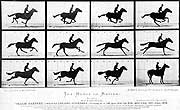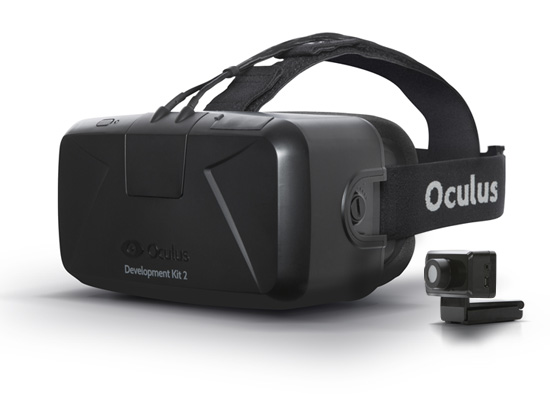- Future of Film
- Jan 06, 2016
What is the future of film?
Although I’m not a hardcore film buff by any means, I’ve been thinking about this question a lot recently.
A Brief History Lesson
Movies as we know them (a set of moving pictures on a flat 2D screen) have been around since 1872. A guy named Eadweard Muybridge (he legally changed his name from Edward) thought it would be cool to string together several pictures taken in rapid succession. Although his method was not the most sophisticated by any means, he put it to the test at a horse race. The images he captured showed the horse’s gallop in slow motion, and this first “video” marked the start of a huge industry. [source]

Muybridge’s pictures
Of course there were many incredible leaps in film technology over the years (great list here), but the one that sticks out the most is the projector. Although there is some debate over the date and creator, we do know the first basic projector entered the world sometime in the mid 1890s. This invention offered an entirely new way for people to watch film. Before the projector came along, small screens and viewing ports limited the size of the audience to several individuals, if that.
All of a sudden, filmmakers had the ability to create content using a medium that could be enjoyed by much larger audiences. This fueled astronomical growth in the movie industry.
Modern Times
Fast forward 120 years and here we are: 2015. What major changes have taken place in film viewing since the 1890s? Here’s a quick (drastically over-simplified) list:
- Sound
- Color
- 3D*
*Can we really count 3D?
Yep, that’s it. Three major advancements (if you look past 3D’s letdowns) in nearly 120 years. And the craziest part? The fundamental piece of the film viewing experience (the screen) has remained virtually unchanged since that flat 2D screen built in the 19th century.
Sure, resolution and framerate are incredible now, but the fundamental piece behind video consumption hasn’t changed in over a century.
What if we looked beyond this simple flat screen design?
It’s Already Happening
Virtual reality has been around for a while, but the tech has finally caught up with the visionaries. With products like the Oculus Rift, HTC Vive, and PlayStation VR right around the corner, mainstream adoption is closer than ever.

The Oculus Rift
With virtual reality, films can become so much more than they are today. Let me set the scene for you.
You’re in a house. It looks like your house. You’re staring out a 60” window. On the other side is a beautiful horse galloping down a beach. Suddenly it has galloped past the window and out of sight. You look around and see your dog Molly chewing a hole in the rug. That’s regular TV.
Rewind.
This time you’re on the beach. You look down and see the water lapping at your feet. You hear a snorting noise to your left. Quickly turning, you see a horse standing two feet from you. It snorts again and begins galloping past you. As you turn your head to follow it, you see a shadow cross the water and instinctively look up. Bill Murray is chasing the horse in a helicopter. You watch both disappear over the horizon.
Not sold yet?
Daydreaming
Now this is the best part of the post. The part where I give some examples of awesome movies/content that could be brought to VR. I’m not super creative, but the goal here is just to get you to think about the possibilities and hopefully get excited!
- Sports games where you have a front row seat (or whatever seat you want)
- Films with completely different perspectives (crawling around like a baby, jumping from tree to tree like a monkey, jumping out of water like a dolphin)
- Minecraft, the movie
- The Tonight Show from the perspective of The Roots
- Aerial combat movies
- Any movie about space ever
- Site-seeing extreme places with interesting hosts
- Horror movies
- Honey I Shrunk the Kids
- Any zombie movie from the perspective of a zombie
- Jurassic Park
- National Geographic films
- Fast and Furious
- Accurate historical re-enactments that are educational but captivating
Devil’s Advocate
In doing research and talking to friends about the idea for this post, I’ve come across many differing opinions. One constant, though, is that people think the idea is crazy. For one reason or another, everyone seems to think that it just won’t happen. Maybe you’re even skeptical, yourself. I thought it would be useful to compile a list of the main arguments against VR movies that I’ve heard:
- Too Interactive - This is the topic that gets brought up most often (by far) in the conversations I’ve had. But to me it’s really an argument for VR movies. People seem to think that following plots will be difficult in VR because you have so much viewing freedom. You might miss that important gesture or billboard that adds to the backstory. And in my opinion that’s part of the appeal! You could watch a VR movie 10 times and see something completely unique each time. It makes for awesome conversation topics too! Finally, unless you’re watching a silent film, surround sound can give you cues for where to direct your focus.
- Anti-Social - People have said that this would completely take away from the experience of watching a movie with friends. You won’t be able to see their reactions or share those knowing glances. My response to this is: yeah, they’re right to a large extent. Of course you could watch the same VR movie at the same place/time (VR theater???), or could overlay your friends’ faces on the movie somehow. But overall, VR has very different social constraints than traditional movies have. Is that a bad thing? Technology changes society. Personally, I don’t see this as either a positive or negative. It’s simply a change.
- Wrong Media Type - “Virtual reality is for games, not movies.” Then how do you explain this? Bryan Bishop over at The Verge has first hand experience that says VR is perfect for movies.
- Impossible to Film - Yes, videographers will have to completely change the way they move the camera. Yes, lighting on set will have to change significantly. Yes, scene cuts will have to be executed masterfully. Yes, long takes will become routine. I don’t think these challenges will be fully solved until years to come, but I have faith the industry will figure it out.
Conclusion
So as this shift in film takes place, what can we expect?
The beginning of the movie era was a time of beautiful chaos. Constraints that traditional theatre imposed (set location, set size, scene change duration, etc.) were smashed and replaced with relatively infinite freedom. People fumbled around a lot, creating new experiences and discovering filming techniques. It took many years before the art was perfected to the point it’s at today.
I think we’ll see a new wave of creativity in VR very similar to that. It’ll take time and lots of mistakes, but I’m excited to see the process unfold and I hope you are too.
How will this impact traditional films? Who knows. It’s too far off to predict much, but I can imagine a day when people get together with family to cozy up on a levitating couch and watch the classic 2Ds. They may decide to go with one of the Hunger Games trilogy. Or maybe they feel like watching Oscar-winning Spotlight. Regardless, I can picture them hovering there with the same attitude as people watching silent Chaplin films today. Reflecting on times past, basking in nostalgia, and most importantly, reminiscing at how far we’ve come.
What do you think? Let me know on Twitter.
Other Reads
I do want to point out that I’m not even close to being on the forefront of this. I’m just passionate about it. Tons of other journalists have done a great job of covering this same topic. Links are below. Additionally, I’ve included a few articles talking about the technology being created to film these movies.
VR as the future:
- Oculus Is Awesome for Games, But It’s the Future of Movies
- There’s a New VR Film Fest, and It May Be Headed Your Way
- Epic Boss Tim Sweeney: VR Destined For A Better Fate Than 3D
- Virtual Reality is Succeeding Where 3D TV Failed
- We Watched a Movie on Oculus Rift and It Manipulated Our Emotions
Filming in VR:
